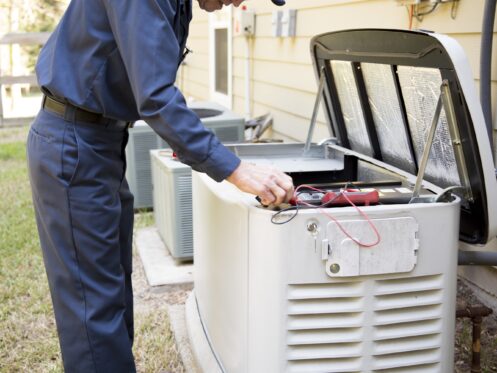When the power cuts out, the last thing you want is to be caught fumbling in the dark. Generators can be a lifeline, but not all of them serve your needs the same way. Some sit quietly outside and jump into action without you lifting a finger. Others get wheeled out, gassed up, and plugged in. If you’re weighing your options, it helps to know what kind of outages you’re preparing for and how much hassle you’re willing to take on.
In this blog, our electrical services experts will help you look at both sides so you can make a clear-headed choice for your home.
How You Use Power Shapes the Right Fit
Every home has a different rhythm. Some families live off a single fridge and a few devices. Others juggle deep freezers, sump pumps, medical machines, and charging stations for every family member. When you’re choosing a generator, the way you use power makes a bigger difference than you might think. You may not need your whole house online during an outage, but you probably want more than a flashlight and a fan.
A portable generator might run a few cords to a couple of appliances, but you’ll have to move fast during an outage and pick what matters most. A standby generator, once installed, handles the switch for you. It doesn’t make you choose between the fridge and the furnace. If you’ve ever had to shuffle food between coolers or light your kitchen with candles, the right kind of generator can shift that whole experience.
Set-It-and-Forget-It Factor
You don’t always know when an outage will hit. Wind knocks out a transformer. A heatwave strains the lines. A car hits a pole at just the wrong spot. If you’re home when it happens, a portable generator gives you a backup option. But if you’re out or asleep, you might not get it running fast enough to stop food from spoiling or the basement from flooding.
A standby generator doesn’t wait for you. It’s wired into your home and starts automatically within seconds of detecting the loss. That means your security system stays on, your sump pump keeps running, and your HVAC system doesn’t miss a beat. There’s a comfort in knowing your lights won’t blink off in the middle of a storm. You won’t have to scramble outside with fuel or wait for daylight to sort it all out. It’s less about luxury and more about not having to think twice in a pinch.
Fuel Access and Storage Matter
Portable generators usually run on gasoline. That sounds convenient at first, but you need to store enough fuel in advance to last through an outage. If you’ve ever filled a gas can during an emergency, you know the lines can stretch down the block. And even if you get gas, it has a shelf life. Let it sit too long, and it breaks down. You’ll need to treat it or rotate it regularly.
If your home has a gas line, you don’t have to refill anything. If it doesn’t, you’ll use a dedicated propane tank that gets refilled by a supplier. That might sound more involved upfront, but it means less panic when the power drops. You’re not racing to find an open gas station or pouring fuel near hot equipment.
Power Output Isn’t Always Equal
Every generator has a wattage limit, and that matters more than most people realize. A portable model may say it can handle 3,000 or 5,000 watts, but that number drops fast when multiple appliances kick on. Refrigerators surge when they start. Furnaces need steady power.
Add lights, phones, and maybe a window unit or two, and you hit the ceiling quickly. That’s where people start juggling cords, turning off one device to run another, and hoping the breaker doesn’t trip. A standby generator is sized based on your home’s real needs. It connects to a transfer switch that manages the load so nothing gets overwhelmed. You can power everything or choose a system that supports just the key circuits.
Maintenance and Longevity Come Into Play
Any generator needs care, but the type and frequency vary. Portable units should be tested and run regularly to keep them from seizing up. Oil changes and clean fuel are musts. You’ll need to pull it out, check the connections, and make sure everything fires up when needed. Some people forget until it’s too late.
A standby generator runs self-checks weekly. It powers on briefly to confirm everything is working and alerts you if something’s wrong. You still need scheduled service, but you won’t get caught off guard. Plus, standby units are built for frequent use. They’re designed to run for hours or even days without trouble. Suppose you live in an area where blackouts last longer than a quick flicker; that level of durability matters. It’s not just about having power. It’s about keeping it stable when you really need it.
Noise and Placement Affect Daily Life
A portable generator sounds like a lawnmower. When it’s running outside your window, the hum becomes part of your day. That might not matter during a storm, but if you live in a quiet neighborhood or have nearby windows, the noise can grate on you fast. Portable models also need open space to vent exhaust.
You can’t run one in a garage or on a covered patio. That limits where you can place it safely. A standby generator has a weatherproof housing and sits on a permanent pad, often near the side or back of your home. It runs quieter, with insulation and mufflers designed to reduce the impact.
You’ll still hear it during testing or use, but it blends in more. And because it’s installed to code, the risk of carbon monoxide or fire drops sharply. You don’t have to worry about dragging it to the right spot or blocking airflow by mistake.
Price Isn’t Just About the Sticker Tag
It’s easy to look at the price and think a portable generator is the smarter deal. You can grab one off the shelf, bring it home, and be ready to go. But once you start using it, the picture changes. You’ll need to keep gas on hand, change the oil, and keep up with maintenance. They wear out faster, too, especially if you rely on them often. They don’t really add anything to your home’s value either.
A standby generator has a bigger upfront cost and needs a pro to install it, but it sticks around for the long haul. It becomes part of your home, not just gear you store in the shed. If you’re planning to stay put, the payoff comes in comfort and reliability. And if you sell, buyers tend to like that it’s already in place.
Whole-Home Option Brings Stability
If your goal is to keep everything running like normal, a whole-home standby generator is the only route that gives you true coverage. It powers your HVAC system, kitchen appliances, internet setup, lighting, and outlets. You don’t have to choose which rooms get powered or unplug one device to use another.
The experience stays consistent. You walk through the house, flip a switch, and everything works as it should. You don’t feel the disruption. That kind of stability changes how you think about outages. It can make a big difference when you’re caring for kids, working from home, or managing health needs that depend on electricity. Portable options have their place for quick fixes or temporary setups.
Choose Your Power Source Wisely
Power loss is never convenient, but the right generator setup in your Chatham, NJ home can make it significantly less stressful. Besides generators, we also offer electrical panel upgrades, surge protection, and EV charger installations.
If you’re ready to explore what backup power could look like at your place, give Pipe Works Services a call, and we’ll help you map it out.





